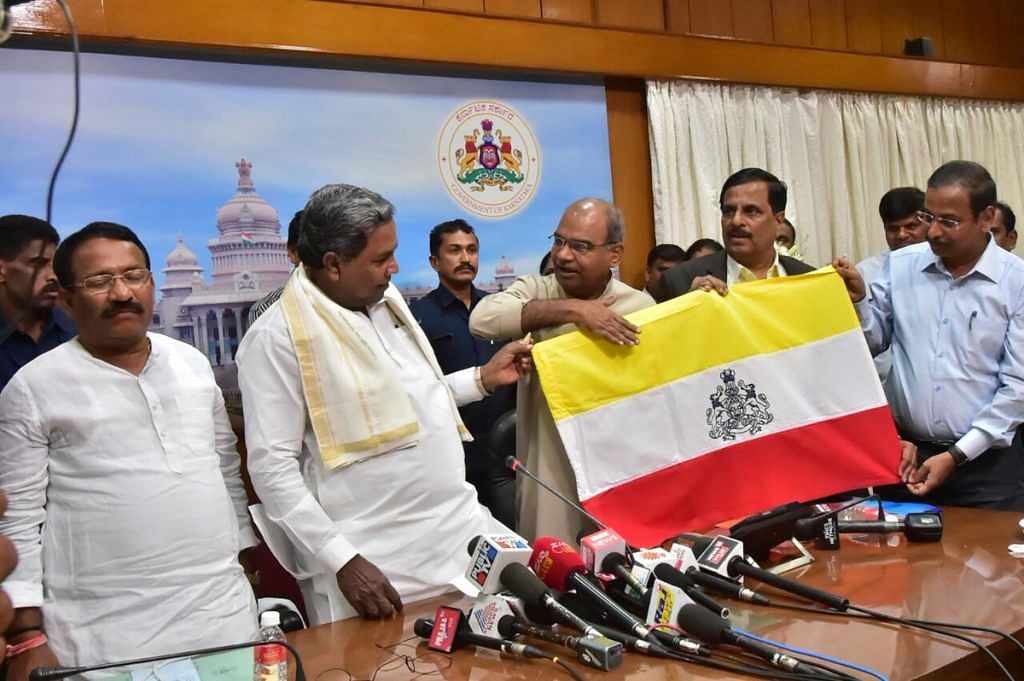The Constitution is silent on states (apart from J&K) having their own flag, and in an election year, the Congress govt is planning to put the Centre in a quandary.
Bengaluru: Karnataka Chief Minister Siddaramaiah seems to have played a political masterstroke by unveiling the ‘Nada Dhwaja’ or state flag Thursday, gaining the upper hand over the opposition BJP with an emotive, identity politics card weeks before assembly elections.
With this move, Siddaramaiah has not only pleased pro-Kannada organisations, he has made ‘Kannadiga pride’ his own preserve. The state government will now send the flag to the union home ministry for ratification, which will put the Centre in a quandary. If the Centre approves the flag, it’ll make Congressman Siddaramaiah look like a hero, among other things; if it doesn’t, the BJP risks being targeted by the Congress during the assembly election campaign.
Significance and legality
The Kannada flag is a tricolour – with the yellow symbolising forgiveness, white signifying peace and red bravery. At the centre sits the state emblem, ‘Gandabherunda’.
Legal experts who advised the state government have made sure that having a state flag isn’t illegal – the Constitution and the Flag Code don’t prohibit any state from having a separate flag, even though no state except Jammu and Kashmir has one as part of its special status under Article 370.
“There is nothing wrong in having a state flag, it is not unconstitutional. I am a proud Kannadiga and a flag is reflective of my sense of pride,” Siddaramaiah has said when asked at various fora why the state needs one.
The Centre’s quandary
Once the proposal goes to the Centre, it will have a huge quandary on its hands. It can approve or reject the proposal, or send it to the President for his opinion. But all three options present problems of their own:
- Approving the proposal would make Siddaramaiah a hero, strengthening him electorally.
- Syama Prasad Mookerjee, ideologue of the BJP’s political predecessor Jana Sangh, had argued for ‘one flag, one Constitution’. That’s still at the core of the BJP’s politics. If the BJP-ruled Centre allows it, it will lose any moral high ground to preach in Jammu and Kashmir on Article 370 and that state’s flag.
- An approval could lead to similar demands from other states, increasing the threat of the rise of sub-nationalistic movements.
- On the other hand, if it doesn’t clear the proposal, its prospects in this year’s Karnataka assembly elections may take a huge hit.
- If it decides to delay the matter, Karnataka is likely to file a legal case, which will require the Centre to have solid legal argument.
Alok Prasanna Kumar of the Vidhi Centre for Legal Policy said: “The Centre will have to build a case and show what Karnataka is violating and make a case for the court to intervene. Seeking presidential reference under Article 143 of the Constitution, which gives the President the power to refer questions of law to the Supreme Court, it has to specifically be within the purview of law. The courts don’t understand questions of national pride.”
Advantages for Congress & Siddaramaiah
With this move, Siddaramaiah hopes to fulfil three objectives:
- It is an effort to preserve the state’s regional identity as it faces constant threats from the Maharashtra Ekikaran Samiti (MES). This regional party has been demanding that the district of Belagavi be handed over to Maharashtra, as a large number of Marathi speakers live there.
- The state government can convert the sense of Kannadiga pride into electoral votes, which would help Siddaramaiah combat the anti-incumbency factor to a certain extent.
- The Congress wants to raise the pitch that it has established a ‘Karnataka model of governance’, which includes regional pride while remaining faithful to the nation.
Arguments against the move
The proposal for a state flag is not a new one. Earlier too, BJP chief minister Sadananda Gowda, in 2012, had sought a separate state flag, which could be unfurled at all government buildings in the state. But the decision was withdrawn, stating that if Karnataka had a separate flag, it would undermine the sanctity of the national flag.
This is the very point being raised by legal experts such as senior counsel B.V. Acharya, a former advocate general and member of the Law Commission.
“This is an attempt to divide the country. We are one nation and one flag; different flags mean we are dividing the country. Just because the Constitution does not have a provision for a separate state flag, one need not take decisions that could divide the country. My opinion is that since the Constitution does not provide for it, there is no need to have it,” Acharya said.
“The Centre should immediately reject the proposal and say that no state should have a separate flag. Since this is not a ‘justiciable matter’, even if Karnataka or the Centre knock on the doors of the high court or the Supreme Court, they may not entertain the plea.”
